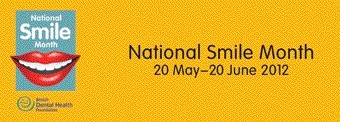
May is National Smile Month and we’re all being encouraged to smile and show off our gleaming teeth as part of an oral health campaign organised by the British Dental Foundation.
For this month’s article we will be talking about dental issues and then we can go on to why it is so good for us all to smile.
If you are working offshore, you will need to have the necessary level of fitness and as part of your OGUK Offshore Medical, your teeth will be looked at.
If your dental health is not good then there is a chance that you might develop toothache or a painful abscess while offshore where there won’t be a dentist on hand to help. If a dental problem becomes really serious then it could be necessary for the individual to be medevaced onshore to receive appropriate treatment.
If your teeth are found to need attention then you won’t be issued with a full certificate. Instead, you will receive a restricted certificate which allows a nominated amount of time to make sure that any dental issues are resolved.
The full certificate will only be issued after your dentist has completed a form confirming that you have undergone the required treatment. If your dental health is really poor you may be refused a certificate until it has been sorted out. For example, if you already had a dental abscess when presenting for your medical, you would not be classed as fit to go offshore.
It’s always a good idea to have regular dental checks and especially before you have your offshore medical.
Poor oral health doesn’t just make your smile look unattractive but can have other effects on your overall health. For instance, gum disease has been linked to heart problems – it is thought that bacteria from sore gums can pass into the bloodstream where it forms a clot-forming protein.
Did you know that someone with gum disease is almost twice as likely to have coronary artery disease that a person with healthy gums?
Looking after your dental hygiene reduces your risk of heart disease and strokes and that fact alone is enough to make any of us reach for our toothbrush.
Dental problems are now being linked to diabetes and for those who do have diabetes it is important to treat any gum disease as this can help reduce blood sugar. It is also thought having high levels of bacteria in your mouth can play a role in developing or worsening existing respiratory infections.
Now that we’ve established the importance of avoiding dental problems, let’s look at the ways we can avoid having tooth decay and gum infections and maintain a beaming smile.
Plaque is a sticky film of bacteria that hardens into tartar around the teeth, particularly in the difficult-to-reach spots where the teeth meet the gums. If plaque is not dealt with then it can lead to the gum infection, gingivitis, which is an inflammation that causes the gums to bleed and feel sore, and also results in bad breath.
The sugar we eat can react with plaque bacteria to create teeth-damaging acids. If you are eating sugary foods, it’s best to restrict them to mealtimes – eating sugary food little, but often, during the day will cause more damage than limiting your sugar consumption to mealtimes only. The acid found in drinks such as colas and red wine can also damage tooth enamel. Smoking is also a major cause of gum disease.
To keep your teeth and gums healthy, you should brush for about two minutes at least twice a day, or more if this is recommended by your dentist. When brushing your teeth, pay special attention to where they meet the gums.
Your toothbrush should be replaced at least every three months, or more often if it is starting to look worn. You can use interdental brushes or floss between your teeth to reach into small gaps.
National Smile Month is promoting three simple messages:
o Brush your teeth for two minutes twice a day with a fluoride toothpaste
o Cut down on how often you have sugary foods and drinks
o Visit your dentist regularly, as often as they recommend
Now let’s think what smiling can do for all of us!
A sincere and happy smile can help to boost your immune system. A smile can help lower stress levels and help us to relax. A cheerful smile can be a terrific communicator and put colleagues at their ease.
Smiling and having fun triggers our bodies’ endorphins which are the chemicals in our bodies that help us to feel a sense of wellbeing and happiness. Apparently, we need three positive emotions to lift us back up after a negative emotion so the more we smile, the better.
Enjoy National Smile Month, look after your teeth and keep smiling.
For more information about National Smile Month see www.nationalsmilemonth.org.
Kelly Paterson is an occupational health advisor / health promotion nurse at Abermed
Recommended for you
